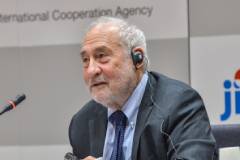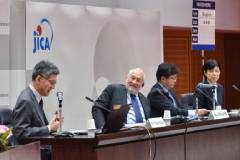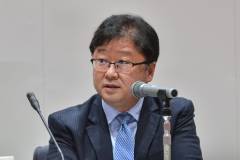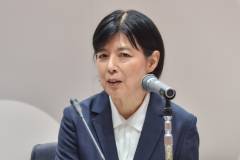Nobel Laureate Joseph Stiglitz Speaks at Knowledge Forum on Global Economy in Multiple Crises
2022.11.14
Nobel Prize-winning economist Joseph E. Stiglitz spoke on "The Global Economy in Multiple Crises: Challenges for Emerging and Developing Countries and Pathways to Enhanced Resilience" at the JICA Ogata Sadako Research Institute for Peace and Development (JICA Ogata Research Institute) in Tokyo on Oct. 7, 2022. The talk was part of the JICA Ogata Research Institute Knowledge Forum series of events. The forum looked at how emerging and developing countries can recover from the turmoil of the global economy and how to create more resilient systems and societies, with a focus on emerging and developing countries.

Joseph E. Stiglitz delivered speech at the JICA Ogata Research Institute Knowledge Forum
The event began with opening remarks by JICA President Tanaka Akihiko. Tanaka introduced Stiglitz, a Columbia University professor and the president of the Initiative for Policy Dialogue (IPD), a non-profit research initiative at the university. JICA Ogata Research Institute has partnered with the IPD on a joint research series focusing on industrial policy and economic transformation in Africa. Tanaka began by discussing the multiple, compound crises negatively impacting the world, including COVID-19, the Russo-Ukrainian War, climate change, rising food and energy costs and fears of capital outflows due to monetary tightening by the United States.
Stiglitz began by saying the current crises had been an important reminder of the importance of resilience. “The global economy has shown itself not to be as resilient as we had hoped.” On economic issues, Stiglitz said not only is the world grappling with inflation, it faces a global downturn caused by flawed central bank policy in the U.S. and elsewhere, where interest rates are being raised to fight inflation despite the fact that inflation is not being caused by excessive aggregate demand. “There’s only one central bank that’s doing the right thing in the world today among the majors, and that’s Japan,” he said.

Takahara Akio, executive Director of the JICA Ogata Research Institute (far left), moderated a talk session
He said the energy crisis exacerbated by the war in Ukraine should be used to reinforce the world’s commitment to the green transition. He also said dependence on fossil fuels, which are disproportionately in the hands of authoritarian regimes, is worse than being dependent on the weather.
Most developing countries were economically adversely effected by COVID-19, and they were unable to soften the blow through increased government spending like developed countries could, Stiglitz said. So, the crisis weakened their economies and increased their debt. This has exacerbated the development challenge. Furthermore, many developing countries face a looming debt crisis because they had taken on too much debt which has become harder to service as the Federal Reserve has raised interest rates. The large number of countries involved could cause the crisis to impact the developed world as well, he added.
Developing countries are also being pressed, often against their will, to take sides in a new cold war between the U.S. and Europe, on the one hand, and Russia and China on the other. At the same time, democracies around the world have done a poor job of winning hearts and minds among developing countries to win this cold war, Stiglitz said. Their multilateral institutions are viewed as unjust, and developed countries are seen as disproportionately responsible for the climate change that disproportionately affects developing countries. Also, Western governments and drug companies have been unwilling to waive intellectual property rights to make it easier for developing countries to vaccinate their populations against COVID-19.
Despite this new cold war, there is an ongoing need for global cooperation, Stiglitz emphasized. All countries share the same planet and need to work together to address climate change, pandemics and environmental issues. Despite Western hostility toward China, it controls the vast majority of the rare earth minerals needed for renewable energy technologies, he noted.
Governments need to build more resilient economies by abandoning neoliberalism and transitioning to progressive capitalism by placing a renewed emphasis on regulation, public investment and social insurance, Stiglitz said. Reinvigorated industrial policies are needed to handle market failures and transitions.
Stiglitz’s speech was followed by comments from Sawada Yasuyuki, a professor at the University of Tokyo Graduate School of Economics. Sawada first recapped Stiglitz’s speech, then posed two questions to him: 1. How should government and global society design and implement a new industrial policy? And 2. What should we expect from a digital transformation?
Stiglitz said good industrial policy will involve governments making sure they are in a position to get a return on their investments when they give money to private sector actors and making sure those actors also put their own money at risk (have skin in the game). There also should be a focus on solving market failures, he said, and having broad objectives beyond just growth (the environment, inequality and structural transformation).

Sawada Yasuyuki, a professor at the University of Tokyo Graduate School of Economic
On digital transformation, Stiglitz mentioned that cell phones allowed Africans to leapfrog ahead technologically and allowed Kenya to bypass regulations that were excessively favorable to banks. He cautioned, however, that digitization will not be a panacea. “It will play an important role, but it’s not going to replace manufacturing- and export-led growth,” he said.
The next speaker was Kayashima Nobuko, senior research advisor at the JICA Ogata Research Institute. She spoke about the importance of not only support for individual projects, but also international collaboration to improve global frameworks, such as international intellectual property mechanisms. She also stressed the need for developing countries to be involved as rule-setters rather than rule-followers, in establishing fairer international frameworks. Then, she asked Stiglitz how we can encourage an environment for lifelong learning in developing countries.
Stiglitz said technology can be key in lifelong learning, noting in particular the rise of massive open online courses (MOOCs). Most of the students taking advantage of such courses are in the developing world, he said.

Kayashima Nobuko, senior research advisor, JICA Ogata Research Institute
In a Q&A session at the end, audience members raised questions such as, “Regarding the debt crisis, apart from debt cancellation, what options could we work out, options that would not cut spending and hurt poor and vulnerable people?” Stiglitz responded that he is enthusiastic about the idea of debt-for-nature swaps, in which a developing country’s debt is canceled in exchange for a commitment to environmental policies. It’s a form of swapping foreign exchange for carbon reductions, he said.
JICA Ogata Research Institute Knowledge Forum Special Edition: Lecture by Prof. Joseph E. Stiglitz

事業事前評価表(地球規模課題対応国際科学技術協力(SATREPS)).国際協力機構 地球環境部 . 防災第一チーム. 1.案件名.国 名: フィリピン共和国.

事業事前評価表(地球規模課題対応国際科学技術協力(SATREPS)).国際協力機構 地球環境部 . 防災第一チーム. 1.案件名.国 名: フィリピン共和国.

事業事前評価表(地球規模課題対応国際科学技術協力(SATREPS)).国際協力機構 地球環境部 . 防災第一チーム. 1.案件名.国 名: フィリピン共和国.

事業事前評価表(地球規模課題対応国際科学技術協力(SATREPS)).国際協力機構 地球環境部 . 防災第一チーム. 1.案件名.国 名: フィリピン共和国.

事業事前評価表(地球規模課題対応国際科学技術協力(SATREPS)).国際協力機構 地球環境部 . 防災第一チーム. 1.案件名.国 名: フィリピン共和国.
scroll